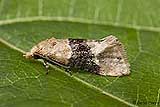Fanny Vogelweith PhD thesis
Host plant effect on immunity of pests: influence of grapevine on ability of European grapevine moth to defend against bio-aggressors
Defended on the 13th December 2013
Funding: ministry of research
Supervisors: Jérôme Moreau and Yannick Moret (Biogéosciences, Dijon), Denis Thiéry (UMR INRA 1065 santé végétale, ISVV, INRA Bordeaux)
Started in October 2010
Summary

Cliquer pour agrandir
In tritrophic interactions involving phytophagous insects, host plants and natural enemies, trophic levels are highly dependent on each other. Host plant may strongly affect directly phytophagous insect and indirectly natural enemies growing on these phytophagous insects. When a natural enemy attacks a phytophagous insect, the host immune system constitutes the last chance for the host to survive to an infection. A great variation of insect immune system is generally found in populations for susceptibility to pathogens, suggesting that variable selection pressures may have shaped and driven adaptation of immune traits. This project aims to determine the influence of both host plant and natural enemies on the larval immune system of grapevine moth pests, Lobesia botrana and Eupoecilia ambiguella.
During these three years, we have demonstrated a strong influence of grape variety on immune effectors of grapevine moth larvae. In addition, the grape variety modulates a trade-off between the constitutive and induced immune pathways. The variable presence of microbes on the surface of grape berries does not explain the trade-off in immune function. Beyond the grape variety effect, we also demonstrated a strong influence of parasitoids on the immune parameters of the grapevine moth larvae. In France, the most immunocompetent populations of grapevine moth are also the most parasitized. This positive correlation between successful parasitism and larval immune parameters seems not explained by a plastic response of the larval immune system to parasitoids presence, but rather by a local selection of larval immune system in response to parasitism pressure suffered by larvae for several years.
The different experiments realized in my thesis confirm the complexity of the tri-trophic interactions between host plant, phytophagous insects and natural enemies. The integration of phytophagous insect immune system seems essential in understanding the interactions linking these three protagonists.
Keywords
immune trade-off, insect immune system, grape varieties, grapevine moth, local immune selection, phenotypic plasticity, successful parasitism, tritrophic interactions
Committee members
Thierry Rigaud (Biogéosciences, Dijon)
Emmanuel Desouhant (LBBE, Lyon)
- extrait:
- lien_externe:
- kc_data:
- a:8:{i:0;s:0:"";s:4:"mode";s:0:"";s:3:"css";s:0:"";s:9:"max_width";s:0:"";s:7:"classes";s:0:"";s:9:"thumbnail";s:0:"";s:9:"collapsed";s:0:"";s:9:"optimized";s:0:"";}
- kc_raw_content:
Host plant effect on immunity of pests: influence of grapevine on ability of European grapevine moth to defend against bio-aggressors
Defended on the 13th December 2013
Funding: ministry of research
Supervisors: Jérôme Moreau and Yannick Moret (Biogéosciences, Dijon), Denis Thiéry (UMR INRA 1065 santé végétale, ISVV, INRA Bordeaux)
Started in October 2010
Summary
[caption id="attachment_1259" align="alignnone" width="160"] Cliquer pour agrandir[/caption]
Cliquer pour agrandir[/caption]
In tritrophic interactions involving phytophagous insects, host plants and natural enemies, trophic levels are highly dependent on each other. Host plant may strongly affect directly phytophagous insect and indirectly natural enemies growing on these phytophagous insects. When a natural enemy attacks a phytophagous insect, the host immune system constitutes the last chance for the host to survive to an infection. A great variation of insect immune system is generally found in populations for susceptibility to pathogens, suggesting that variable selection pressures may have shaped and driven adaptation of immune traits. This project aims to determine the influence of both host plant and natural enemies on the larval immune system of grapevine moth pests, Lobesia botrana and Eupoecilia ambiguella.
During these three years, we have demonstrated a strong influence of grape variety on immune effectors of grapevine moth larvae. In addition, the grape variety modulates a trade-off between the constitutive and induced immune pathways. The variable presence of microbes on the surface of grape berries does not explain the trade-off in immune function. Beyond the grape variety effect, we also demonstrated a strong influence of parasitoids on the immune parameters of the grapevine moth larvae. In France, the most immunocompetent populations of grapevine moth are also the most parasitized. This positive correlation between successful parasitism and larval immune parameters seems not explained by a plastic response of the larval immune system to parasitoids presence, but rather by a local selection of larval immune system in response to parasitism pressure suffered by larvae for several years.
The different experiments realized in my thesis confirm the complexity of the tri-trophic interactions between host plant, phytophagous insects and natural enemies. The integration of phytophagous insect immune system seems essential in understanding the interactions linking these three protagonists.
Keywords
immune trade-off, insect immune system, grape varieties, grapevine moth, local immune selection, phenotypic plasticity, successful parasitism, tritrophic interactions
Committee members
Thierry Rigaud (Biogéosciences, Dijon)
Emmanuel Desouhant (LBBE, Lyon)
